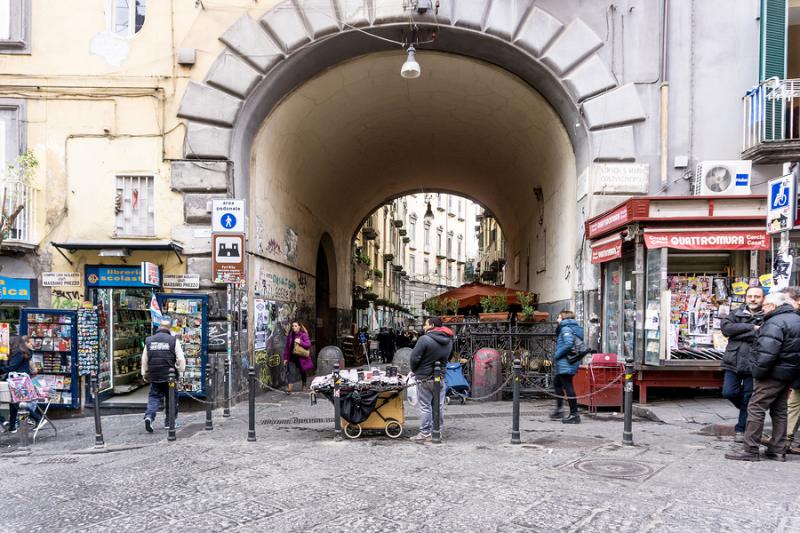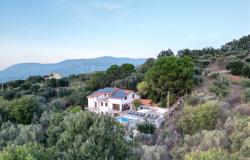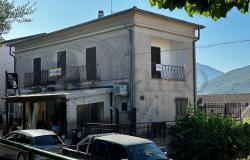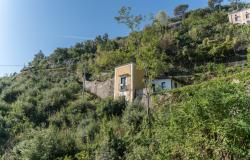by: Kristin Melia
Neapolitan—is it a language or a dialect? Who speaks it and where? Also, when should one speak Italian and when should one speak in dialect? Italy, as a state, is a relatively new and rather miraculous invention. Against all geopolitical odds (European Statesmen Count Metternich once called Italy nothing more than a geographic expression), the Italian Republic was born in 1871 after several nation states unified to form what we now call Italy.
It took almost 100 years for Italian to even begin to become the predominate language spoken in households and streets, mostly thanks to the invention of television and the national network RAI. Lord help us all in the age of the internet—perhaps we will all be speaking in hashtags and emojis in the not so distant future.
No chance of that happening in Napoli. Come what may, families and merchants across Napoli and its environs often prefer to speak Neapolitan, the old language of the Kingdom of Two Sicilies. Musicians and magistrates, butchers and barman all frequently slip into the local dialect. In the years I have lived in Napoli, I have tried desperately, often in vain, to join this secret society of Neapolitan speakers.

It is an all but impossible language to learn. Italian fluency seems mostly a hindrance to the acquisition of Neapolitan dialect. Imagine a pair of scissors taken to a steady stream of vowels, then chopped up and reassembled to form the linguistic equivalent of a tapeworm. Northern Italians find Neapolitan virtually incomprehensible and yet many are fascinated by the strange undulations of this impenetrable dialect.
Last week, I sat down with Professor Ermete Ferraro, a noted expert of Neapolitan, to set the record straight. To start, I asked him how one might learn Neapolitan and whether Neapolitan even qualified as a language.
Dr. Ferraro immediately informed me that the whole question of whether Neapolitan is a language or a dialect is beside the point. French, Spanish, Portuguese (all of the Romance languages really) are simply regional dialects that trace back to Vulgar Latin. The winners write history. With that has evolved the distinction of major global languages. Either way, Neapolitan, which most assuredly has a unique grammar structure and a robust literary cannon, qualifies as a language.
Nowadays in Napoli, the distinction between language and dialect is in the eye of the beholder. Many proud Southern Italians, some of whom are nostalgic for the days of the Kingdom of Two Sicilies, have turned this into a political debate, maintaining that Neapolitan is a language and ought be respected as such. One can certainly understand their point.
Call it what you like, Neapolitan is a joyously piquant language full of irony and comedy. Dr. Ferraro believes it is the linguistic inheritor of ancient Greek comedies. The gestuality, musicality and jocularity of Neapolitan make it simply impossible to ignore. Now if only I could learn how to speak it properly.
Unfortunately, as Dr. Ferraro notes, those who write Neapolitan well often do not speak it well and vice-a versa. Thusly, the best way to learn Neapolitan is to merely live amidst those who speak it and jump head first into the linguistic heart of darkness it inhabits. My adventures in Neapolitan language acquisition can best be described as a baptism by fire.
Below are my tips to either fake it ‘til you make or learn just enough Neapolitan to be dangerous on the vicos and vias that curve through Napule.
1) Drop vowels: Words in Neapolitan often drop the final vowels that would exist in their Italian equivalents. This is particularly true with verbs. To speak Neapolitan means to have far too much to say in finite time. Words tumble forth in a brash staccato of urgency. Whereas the Italian phrase for I need to buy a house is a decidedly languorous “voglio comprare una casa,” in Neapolitan that same phrase is “aggia accattà na' casà” Often the “–re” ending of verbs is summarily guillotined in Neapolitan. So when in doubt, speak Italian as if pressed for time and chewing more gum than Sean Spicer can fit into his mouth at a White House Press Conference. A gloriously poetic image to be sure.
2) The Schwa: ‘O’ and ‘E’ vowels at the ends of words in Neapolitan sound nearly identical. In fact they both sound like an “uh” or what linguistics geeks call the schwa sound. One need look no further for an example than the internationally famous song, ‘O sole mio. Both the ‘e’ at the end of sole and the ‘o’ at the end of mio are an ‘uh’ in Neapolitan. For that reason, one can almost immediately determine whether the singer of said song is a native Neapolitan. Listen to Il Volo or even Luciano Pavaorotti sing ‘O sole mio. They unwittingly pronounce the hard ‘o’ and ‘e’ vowels, which sound impossibly gauche in Neapolitan. Also everyone knows that Enrico Caruso, a true Neapolitan, made this song great. So use the schwa sound and you may just barely manage to fool others that you at least have a Neapolitan mother-in-law.
3) Sing, Sing, Sing: This seems like the kind of stereotype that Neapolitans might bristle at, and yet not one of us (myself included), would deny that Neapolitans sing, A LOT! Whether out of boredom, joy or most notably passive aggression, there is always a song to be hummed, drummed or belted. A local favorite is 'O surdato 'nnammurato which reaches the raucous crescendo of “Oje vita, oje vita mia.” I learned from my crazy Neapolitan mother-in-law that anyone can and ought to sing this refrain on incessant repeat to express every emotional conundrum possible. Who needs emojis when you are a tone-deaf 93 year old Neapolitan woman, or as in my case, an Americana cretin who cannot be trusted to boil a pot of pasta. Don’t know what to say? Respond with a passive aggressive song.
4) Proverbs: There is a proverb for every occasion in Neapolitan. Learn a few proverbs and if you are tongue tied, just state the proverb with brazen confidence, wave your hands like a passionate statesman and rhetorically state, “e verò o nò?” In English, am I right or am I right? My favorite Neapolitan proverb is “chi chiagne fotte a chi ride” which literally would translate as “he who cries f*cks over he who laughs.” That does not even begin to express the true essence of this proverb which I would more accurately translate to mean: crybabies are jealous mofos and you lady bosses out there just don’t pay them any heed. Learn a proverb, practice it in the mirror and speak with absolute, unquestionable charisma. A list of famous proverbs can be found at: (http://napoli.fanpage.it/i-dieci-proverbi-napoletani-piu-belli/)
5) Confidence!: Neapolitans speak with remarkable conviction about many topics that range from whether or not to include onion in a proper ragù (No!) to whether you should cremate a dead relative (the answer to this would also be an emphatic NO!). Even the famous Neapolitan comedian, Totò did not speak Neapolitan dialect in his films as much as we tend to think. As Dr. Ferraro recently pointed out to me, what made Totò so essentially Neapolitan was his charisma. In Napoli, we are known for many things but apathy is not one of them. Perhaps this is why when I ask Neapolitans when and why they speak dialect as opposed to Italian, they are unable to precisely answer. I suspect the answer is quite simple. Neapolitan is simply a language of conviction and we use it to express feelings of all shades.
The Spanish philosopher Miguel de Unamuno often said that “cada filologia es una filosofia” or “every philology is a philosophy.” With that in mind, I asked Dr. Ferraro what he thought Neapolitan’s essential philosophy was.
“That is a difficult question to answer,” he told me, “Napoli is a city of colonizers and foreign powers. Many of whom left their mark on Naples. But I also think we left an undeniable mark on them.” I struggled to understand how this answered what I thought was my rather erudite question. Now, I think I understand.

The best philosophy to describe Neapolitan is its very existence.
It is a spoken and written language whose use spans all classes and quarters. In the age of television and the internet and all of this subsequent linguistic homogeneity, the Neapolitan language refuses to be ignored. Walk down a hidden vico in Chiaia or a stradone in Scampia and Neapolitan soars through the aroma or simmering Genovese and backfiring scooters. It is classless and timeless. Neapolitan is here to stay and what a joy it is. Now if only I could convince my neighbors that I know how to speak it.
Kristin is former civil servant who now spends her time stomping around Napoli and the Amalfi Coast cooking, hosting wine and food tours and occasionally screeching in Neapolitan. She runs the food and travel company Sauced & Found, which provides visitors to Southern Italy excuses to drink wine under the guise of learning about ancient grapes. (She also uses the same excuse on herself). When not hosting guests on said tours, she gavages herself with Margherita Pizza.












